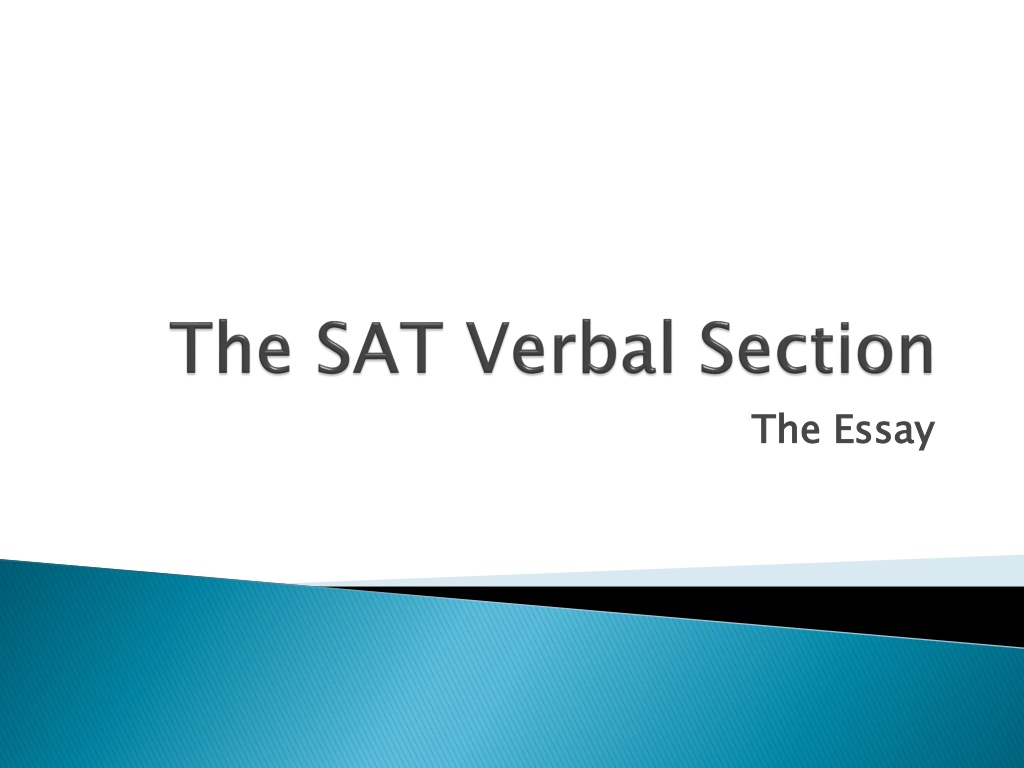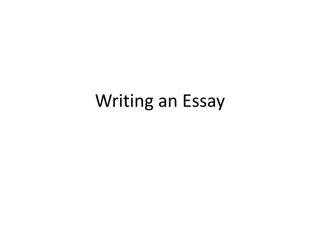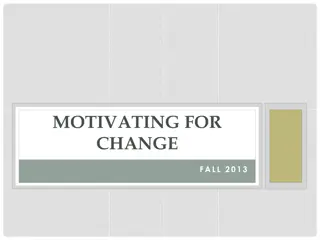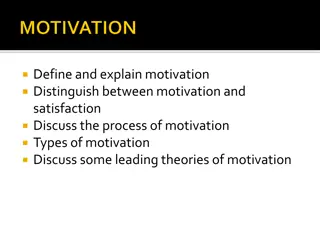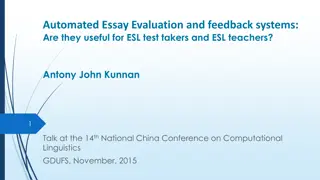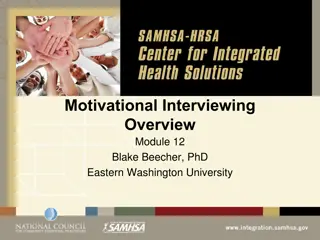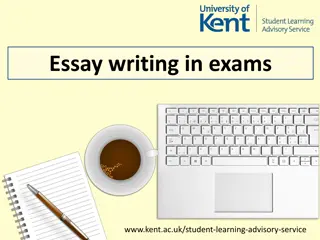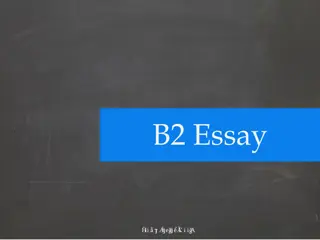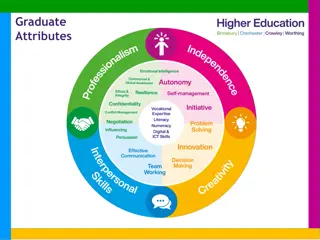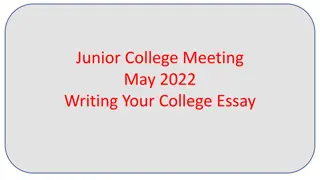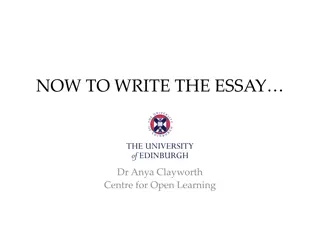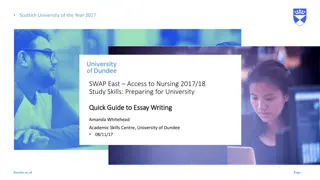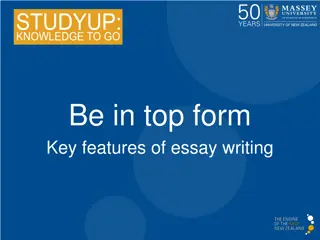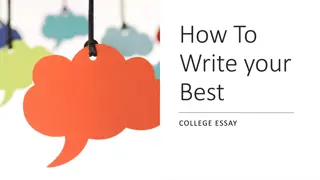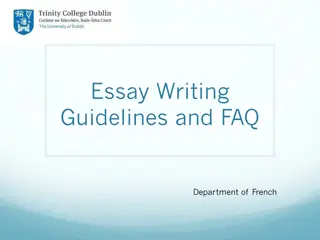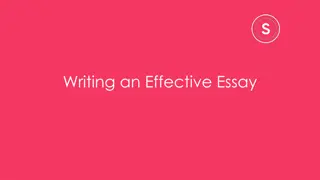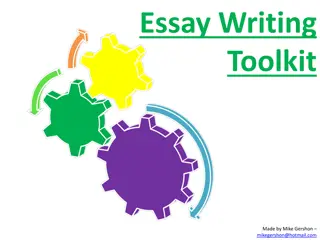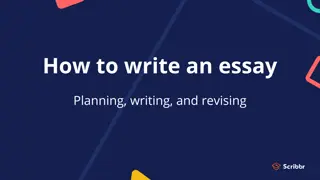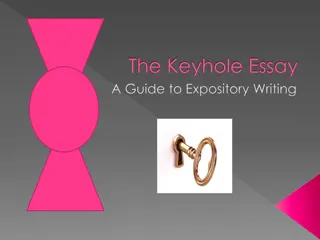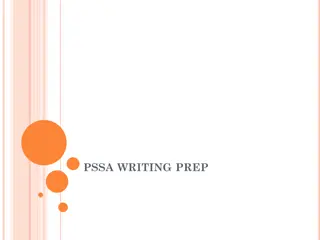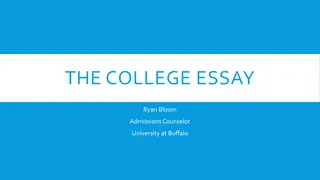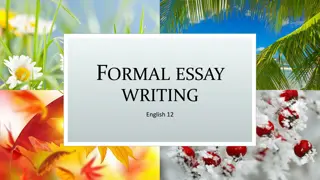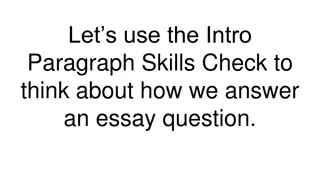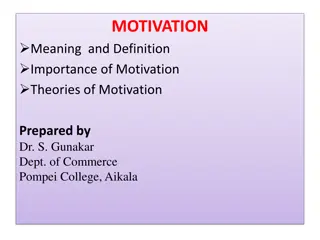Understanding Motivation for Change in Essay Writing
The essay discusses the importance of change and motivation, emphasizing the internal drive for change. It explores the risks and benefits associated with embracing change versus staying stagnant, highlighting that motivation for change comes from within. The prompts typically revolve around responding to quotes, requiring the writer to express their perspective supported by reasoning and examples. Various grammatical concepts like subject-verb agreement, tense consistency, and pronoun-antecedent agreement are also covered.
Download Presentation

Please find below an Image/Link to download the presentation.
The content on the website is provided AS IS for your information and personal use only. It may not be sold, licensed, or shared on other websites without obtaining consent from the author. Download presentation by click this link. If you encounter any issues during the download, it is possible that the publisher has removed the file from their server.
E N D
Presentation Transcript
The Essay The Essay
Always the very first section of the test 25 minute time limit No structural requirements No length requirements Scored on a scale of 1-6, graded twice Prompts are almost always a response to a quote or excerpt.
To change is to risk something, making us feel insecure. Not to change is a bigger risk, though we seldom feel that way. There is no choice but to change. People, however, cannot be motivated to change from the outside. All of our motivation comes from within. Adapted from Ward Sybouts, Planning in School Administration: A Handbook Assignment: What motivates people to change? Plan and write an essay in which you develop your point of view on this issue. Support your position with reasoning and examples taken from your reading, studies, experience, or observations.
*Subject followed by prepositional phrase One of the boats is/are sinking. The man with the two dogs is/are walking down the street. *Subject following There There is/are always two men on guard at this post. There was/were only two men at the door to greet us. *Subject after the Verb Far away from the rest of the crowd stand/stands the three boys. Beneath those pictures on the wall is/are the artist s name. *Compound Subjects joined by Or or Nor Neither the book nor the paper was/were disturbed on the desk. Neither the two boys nor the girl want/wants to go eat breakfast.
*Consistency of Tense Because she sang so beautifully, she wins the contest. The hero of the story tries to recue the child, but he was not successful. *Past Perfect Tense had_______ Until last Friday, we thought we had lost the book. Jenny told us that she had changed her mind before coming to class
*Pronoun Antecedent Agreement Each player must put their own clothing in the locker. If someone calls, tell them I left early. Neither of the girls brought their uniforms. *Pronouns as Compound Elements Betty went to the store for Susan and I/me. Janet and I/me read the book If Gerry and she/her had waited, the park would have opened.
*Ambiguous Reference They say in the paper that scores have dropped dramatically. It surprised me when you came home early. Bobby bought ice cream for John and his sister. *Who vs. Which He sat in a chair who/which was painted red. He is the boy who/which is the editor of the paper.
1. Gary and I saw the students which were responsible for all the damage you and she discovered. 2. The new boss wanted every employee to sign their name on the contract which he had prepared, but John and she decided they would rather quit. 3. If you want to learn how to drive in the city, one should consider taking driver s education classes like Sam and I did.
Modifying phrases should be placed as near as possible to the words they modify. The boys saw the red car looking out the window. Looking out the window, the boy saw the red car. What s wrong? Lying on the desk, Jerry read the letter. Singing in the treetops, I saw a bird. He enjoyed watching the cloud formation lying on the lawn. Covered with cream gravy, the waitress served the potatoes.
Parallel structure in a sentence is critical, and many times, we shift our structure without realizing it. He likes boating, hiking, and to run. Tell me his name and where he lives. He is tall, red-headed, and has freckles. I decided to go home, to get my gear, and later I went fishing.
A double negative is two negative comparisons applied to the same idea. I haven t seen nobody. We don t have hardly any. I didn t get no sleep last night.
Using the right conjunctions is important! Coordinating means you want to join ideas of equal rank of value in a sentence. So, the appropriate conjunctions are: and, but, or, for, nor, yet. James played flute, and Tommy played trumpet in the band. Subordinating conjunctions are used when you want to join two unequal ideas. Some of these conjunctions are: after, as, before, since, because, although, if, unless. Although Sue cannot pay her credit card bill, she still charges merchandise to her account.
An idiom is an expression in which the words have developed a special meaning in relation to each other. If the words are changed, the expression is no longer an idiom. Usually, the key involves a preposition. Correct forms of idioms: Agree with Agree to Agree on Aim at Aim for Part with with a person to a proposal on a plan at a target for perfection with a thing differ from differ with overrun by overrun with wait for part from from something else with someone by a truck with ants for a person from a person
Faulty form: Faulty form: Correct form: Correct form: Among each other Bank on Could of In back of Leave us go Off of, off from In contrast to Concerned in Working at Prevent something to move In appreciation about In regards to Being that Kind of Different than Filled up with Among each other Bank on Could of In back of Leave us go Off of, off from In contrast to Concerned in Working at Prevent something to move In appreciation about In regards to Being that Kind of Different than Filled up with Among themselves Depend on, rely on, count on Could have Behind Let us go Off In contrast with Concerned with Working with Prevent something from moving In appreciation of In regard to Since Rather Different from Filled with Among themselves Depend on, rely on, count on Could have Behind Let us go Off In contrast with Concerned with Working with Prevent something from moving In appreciation of In regard to Since Rather Different from Filled with
*Fragments -Before you get into your car to come to my house. -After changing the tire on the car and resuming our trip. *Run-on Sentences -Last year, I saw the Grand Canyon, this year I will see Niagara Falls. -John plans to mow the lawn this morning, he will go to the movies later.
The directions will ask you to pick the best choice; not just the correct choice. It is entirely possible that there is more than one answer choice that is grammatically correct. Today s doctors must consider both how a disease is caused and its cure. a. Its cure. b. Is it going to be easily cured. c. if it has a cure. d. How it is cured. e. The disease s ability to be cured.
